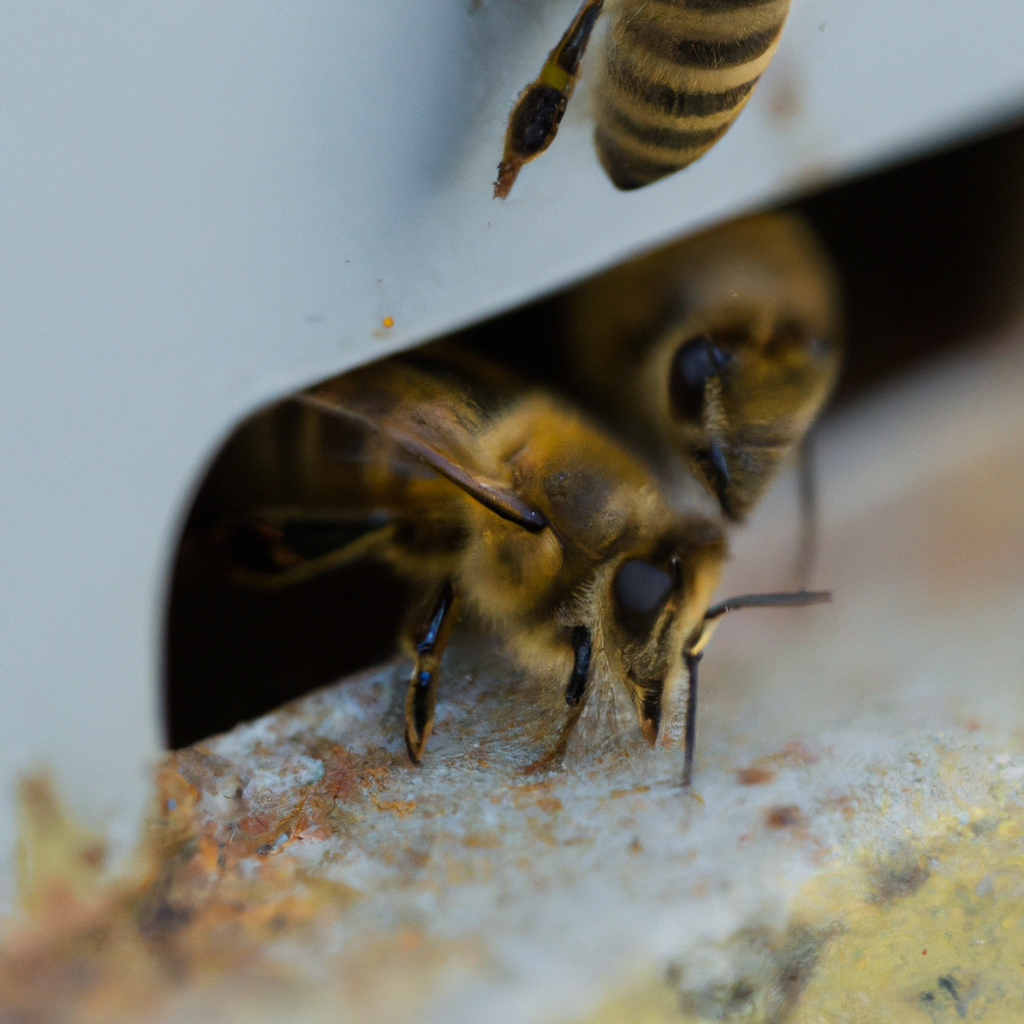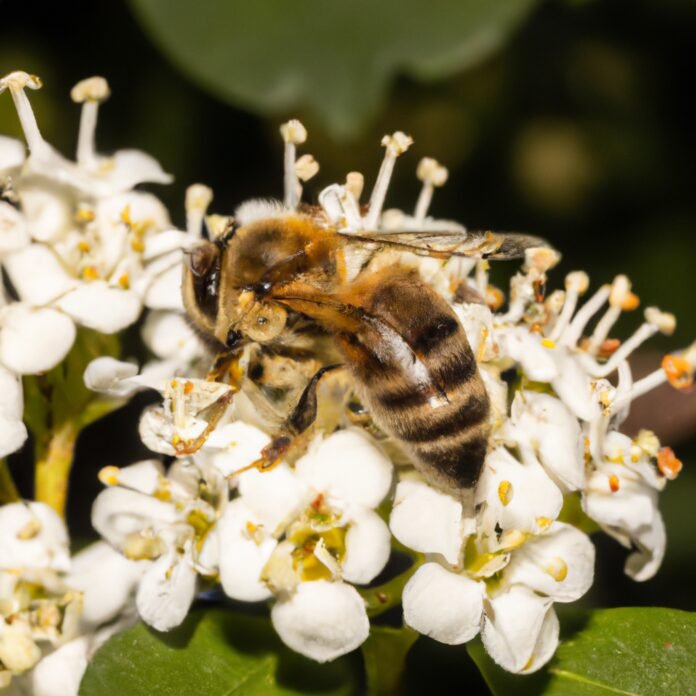Bees are essential to life in the gardens and on the farms of our planet. Without them, the process of pollination would be slowed down significantly and our food supplies would be drastically reduced — resulting in a major blow to the global agriculture industry. But what is the role of bees in pollination and how does their work benefit agriculture? Let’s take a closer look.
1. “Nature’s Unsung Heroes: The Vital Role of Bees in Pollination”
Bees are often thought of as annoying insects that give painful stings. However, these small but mighty critters play an invaluable role in pollination, which helps to maintain the delicate ecological balance of our planet. Without the hardworking honeybees, some of our most loved fruits and vegetables wouldn’t exist, such as apples, blueberries, melons, onions, squash, and even coffee!
Pollination is the transfer of pollen from a flower’s male sex organ to its female sex organ, which is then used for fertilization and reproduction. Honeybees transfer pollen from the male parts of one flower to the female parts of the flower on the same plant or on a completely different variety of plant. As the bee makes its rounds, it carries hundreds of different types of pollen from flower to flower.
The bee’s body is made for collecting and distributing pollen, with their little hairs hiding pockets for both nectar and pollen. When a bee alights on a flower for nectar, it brushes against the anthers and stamens (male parts) and collects pollen on its fuzzy body. As the bee moves from flower to flower, it brushes against the stigma (female part) and deposits the pollen, allowing fertilization. This is called cross-pollination, and it is essential for a huge range of plants to survive and reproduce.
Honeybees aren’t the only pollinators, of course. Other insects like butterflies and wasps, along with birds, bats and even some mammals act as pollinators. But honeybees are by far the most efficient pollinators, making them nature’s unsung heroes.
- Bees play an invaluable role in pollination, which helps to maintain the delicate ecological balance of our planet.
- Pollination is the transfer of pollen from a flower’s male sex organ to its female sex organ.
- The bee’s body is made for collecting and distributing pollen, with their little hairs hiding pockets for both nectar and pollen.
- Honeybees aren’t the only pollinators, of course.
- But honeybees are by far the most efficient pollinators, making them nature’s unsung heroes.
2. “A Symphony of Pollen: How Bees Harmonize Agriculture and Biodiversity”
The relationship between bees and agriculture is a well-known phenomenon. Not only can bees help with pollination, but they also help to create biodiversity in the area. This beneficial relationship has been observed for centuries and is an integral part of our food system and ecosystem.
The effect of bees on biodiversity is remarkable. By pollinating different plants, they are helping to keep certain species alive. There is a natural harmony between the plant kingdom and the bee kingdom that benefits both parties. A single bee can carry pollen from one species of flower to another, allowing different species of flowers to cross-pollinate and become even more complex and diverse.
The Benefits of Pollination
The bees’ role of pollination is incredibly beneficial for agriculture. By providing pollination, bees contribute to the growth of different crops. This helps ensure greater food security as it increases the likelihood of bountiful harvests. Pollination also helps to increase crop yields from says to years, allowing farmers to have a more successful harvest.
Bees as Vital Cogs of the Eco-system
Bees play an important role in the grand scheme of things. Without bees, our agricultural and food systems would be significantly less stable. Moreover, they contribute to biodiversity. In protecting our forests, biodiversity protects our environment from weather extremes, allowing us to have a natural balance within our eco-systems.
- The relationship between bees and agriculture has been observed for centuries.
- Pollination helps to increase crop yields.
- Bees contribute to biodiversity, protecting the environment from weather extremes.
The relationship between bees and agriculture is a beautiful and delicate symphony. The simple act of pollination helps to create balance and harmony not just between the two living kingdoms, but between our own species and the fragile environment of our planet.
3. “Wings of Gold: Uncovering the Invaluable Contribution of Bees to Our Food Supply”
What do apples, sunflowers, and almonds all have in common? They’re all plants that require bees to pollinate them in order to grow! Without pollinators such as bees, many of the plants used for food would not survive. Bees are, quite literally, the wings of gold that keep our food supply going.
- The Role of Pollinators: Pollination ensures that plants are able to produce fruit or nuts. Many of the foods we eat everyday require pollinators to distribute pollen in order to grow properly. Such foods include apples, nuts, squash, and most other fruits. In other words, pollinators are essential for growing our food.
- The Impact of Bees: Bees are an important species of pollinator, responsible for more than 30% of world’s pollination. They’re also vital for ecosystems—according to the Center for Biological Diversity, 70.6% of the world’s flowering plants depend on animals, like bees, for pollination.
The prevalence of bees in ecology makes them invaluable to our food production processes. As a result, bee colonies are managed in many countries across the world. Beekeeping and other forms of apiculture are common agricultural activities that involve the domestication of bees, and cultivating their hives to maximize their pollinating capabilities. Commercial bee bystanders are also widespread, as a result of the need for honey and other bee products.
The success of the farming industry is directly related to the efforts of bees. Looking at the evidence, it would be true to say that without bees, much of our food supply would be drastically reduced. Bees are truly the wings of gold that keep our food system going.
4. “The Buzzing Architects: Unraveling the Intricate Dance between Bees, Flowers, and Farmers
The staggering tenacity of the honey bee continues to amaze. An iconic part of the global ecosystem, bees are extraordinary architects of a multi-species cycle.
- The Buzz of Pollination – Through a process known as pollination bees are credited with allowing for the reproduction of over 70 percent of flowering plants worldwide. The bee’s unrelenting labor of pollination provides an essential link between plants and the reproduction of their flowers.
- The Human Dependency – For farmers, the health of the bees is critical. Not only do flowers rely on bees for their pollination, but foods such as apples, almonds, and other fruits and vegetables rely on their buzzing wings for the health of their crops. It is estimated that in the United States alone, between $29 and $33 billion worth of agricultural produce is directly attributed to the help of honey bees.
- The Human Impact – The bee is hardworking and undeterred, but that doesn’t stop the forces of human activity in polluting the environment with the use of chemical pesticides, monoculture farming, and improper land management. As humans continue to encroach upon the bee’s compact habitat, the damaging environmental impact poses a threat to their continued survival and, by extension, farmers’ crops.
Such is the intricate relationship between bees, flowers, and farmers: an often unseen dance of nuance, characterized by the give and take of the man-made world and the natural world. The complexity of it all is a marvel––which, when understood, can be seen as a power of coexistence, or a vital lesson in interconnectedness. The onus is on us to recognize and protect the fragility of the buzzing architects of our environment.
From the buzz of a bee pollinating a vibrant flower to its integral role in the food economy, the industrious bee is a majestic reminder of the preciousness of our interconnected natural world. By honoring and protecting the humble bee, we safeguard the integrity of our environment and the long-term sustainability of our agricultural systems. Let us be mindful of the unparalleled role that bees play, and continue to do our part in cherishing their importance for generations to come.



